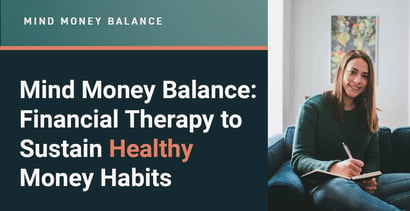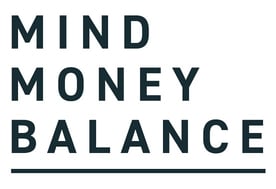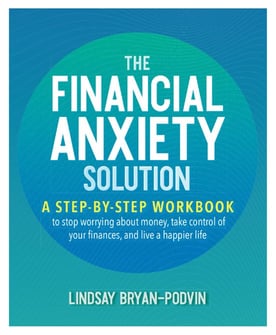
In a Nutshell: Conventional financial literacy training assumes that if people can learn how money works, they can address their problems. But research shows that knowing the basics doesn’t necessarily build healthy financial habits. As a licensed professional therapist with specialized education in financial therapy, Lindsay Bryan-Podvin of Mind Money Balance examines financial behaviors in terms of their underlying emotions. Clients who receive coaching and therapy through Mind Money Balance can emerge with a stronger foundation for a productive financial life.
Something is wrong with financial literacy training. While it can be good at dealing with the nuts and bolts of how money works, it doesn’t go below the surface to address underlying motivations and feelings around finances.
When people don’t understand their relationship with money — or they don’t know how to change it — they often repeat the same counterproductive behaviors. But if they can discover what really drives harmful spending patterns, they can start rebuilding toward financial wellness.
Mind Money Balance, the brainchild of Licensed Professional Therapist Lindsay Bryan-Podvin, goes beyond budgeting spreadsheets and checkbook balancing exercises to probe core behaviors related to money.

Bryan-Podvin takes clients on a journey of self-exploration and discovery, meeting uncomfortable realizations with compassion and empathy. Mind Money Balance helps clients learn to make behavior choices that feel good and align with their personal financial goals.
“Most people know budgeting basics — spend less than you earn and don’t carry credit card debt,” Bryan-Podvin said. “My job is to explore what makes it hard for you to set up a budget and to learn why what you’ve tried in the past hasn’t worked.”
According to Bryan-Podvin, research shows that, although people say the conventional financial literacy training they receive is helpful, it usually doesn’t move the needle in terms of behaviors. That disconnect between what people say and what they do opens a space for therapists with financial training, like Bryan-Podvin, to provide a path to insights that lead to genuine change.
“Financial therapy is psychotherapy with a layer of financial wellness,” she said. “I help people understand why they feel the way they do about money and make the choices they make.”
Coaching Explores Root Causes of Money Behaviors
Bryan-Podvin is a Licensed Master Social Worker who earned a Master’s in Social Work at the University of Michigan. She is certified through the Center for Financial Social Work and the Financial Therapy Association.
A frequent blogger, article writer, and podcaster, she is also the author of “The Financial Anxiety Solution,” a self-paced workbook designed to reduce money stress by applying therapy techniques. She bases her practice in Michigan and offers remote individual therapy to all Michigan residents.

But because money problems don’t have boundaries, Bryan-Podvin reaches beyond her individual practice through Money Mindset Coaching to help clients learn to do more of what they love and less of what they don’t.
The idea to combine traditional and financial therapy came to Bryan-Podvin after she landed her first job with a nonprofit just out of grad school. When she received her first paycheck, she realized she would earn less as a professional than she did as a waitress in college. She felt anxiety arising from financial insecurity.
“I consumed as much personal finance content as I could,” she said. “And while it was helpful, a lot of it told me it was my fault for not making ends meet.”
Plus, her lack of financial training meant she couldn’t offer financial counseling to clients with the same problems. Many clients seek therapy because of money issues, but traditional therapists lack the qualifications and experience to help them.
“When you bring up money matters with a therapist, they’ll do a session or two with you and refer you to someone else,” she said. “Through my training with the Center for Financial Social Work and the Financial Therapy Association, I learned how to merge the two while staying in my lane.”
Replacing Bad Habits with Good Ones
Bryan-Podvin founded Mind Money Balance in 2018. As a critical thinker and social justice advocate, she focuses her coaching practice on progressively minded millennials like herself. She’s a community volunteer who contributes to various local and national nonprofit organizations.
She coaches clients who struggle with the same financial anxiety challenges she faced at the beginning of her career. Many come to her with excessive student loan debt or a problem she calls debt cycling, where they accumulate debt, pay it down, and then build it back up again in a vicious cycle.
“We take slightly different approaches with those problems, but the main message is the same — that debt is not inherently a bad thing and that having it isn’t a character flaw,” she said.

Student loan clients alleviate their anxiety by acknowledging positive outcomes from their investment in higher education. By considering their debt as a stepping stone rather than a burden, they prepare themselves to build strategies to alleviate it.
Clients struggling with debt cycling learn to probe the emotions associated with backsliding. Classical psychotherapy insights come to the fore when Bryan-Podvin helps those clients associate destructive behavior with the brain’s hormonal reward system.
Clients who would rather max out a credit card than miss a brunch with friends feed their craving for the connection hormone oxytocin. The happiness hormone serotonin is the culprit when the problem is chronic overshopping. And when people seek quick hits of gratification through spending sprees, the problem is the excitement hormone dopamine.
Clients then work to develop new habits to feed those needs in constructive ways.
“People in personal finance will tell you to stop spending,” she said. “We know it’s better to replace a bad habit with a good one than with nothing.”
Reducing Shame and Stigma Through Financial Therapy
Although the stigma attached to traditional therapy may be on the wane, it’s still difficult for some people to admit they need help. On the other hand, discussing financial issues with anyone outside a person’s most intimate circle is still largely taboo. Bryan-Podvin has the challenge of helping clients get comfortable discussing both.
She also knows that, in many cases, even committed couples have problems talking about money. Unplanned spending and mismatched financial priorities frequently wreak havoc on relationships.
Through the Clarify Your Money couples course, Mind Money Balance integrates techniques from individual therapy into a couples context. Partners learn to understand each other’s emotions around finances and build a team approach to money decisions. When couples see their finances from a common point of view, planning and executing a positive financial strategy becomes far less stressful.
“It’s a self-paced course that helps people learn values-based spending,” Bryan-Podvin said.
No matter how clients interact with services on Mind Money Balance, they benefit from Bryan-Podvin’s transparency and accessibility. There’s no specialized language or jargon on the site or in sessions.
Clients emerge from Mind Money Balance more comfortable with themselves, more confident with money essentials, and more skillful at prioritizing healthy financial behavior. They learn that dealing with money isn’t as complicated as they made it out to be and that taking one positive step forward makes taking the next one easier.
“Misunderstanding and false assumptions give rise to stigma,” Bryan-Podvin said. “By being clear and direct and not using euphemisms for mental health, we give people permission to acknowledge their struggles.”




